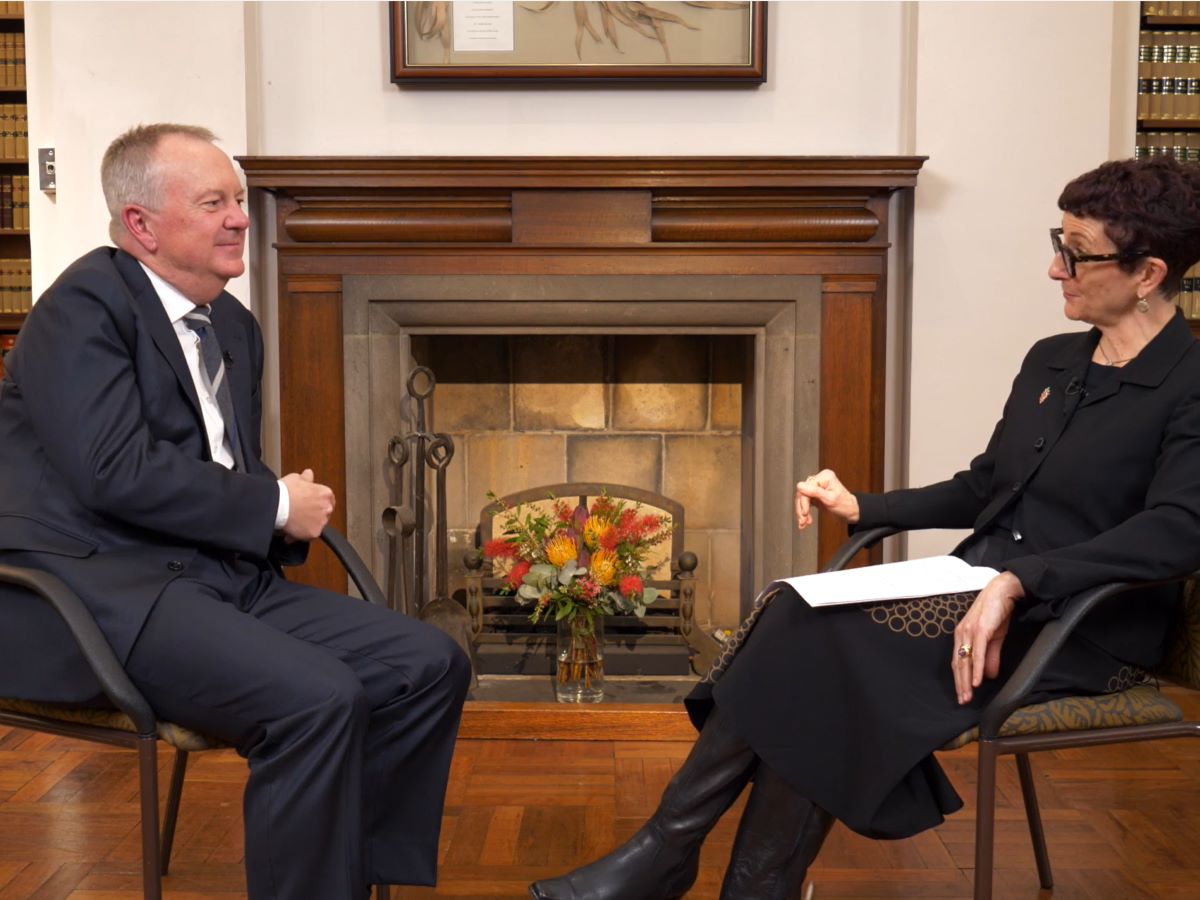Victorian State Coroner Sara Hinchey: Shining Light on the Coroners Court
Unearthing buried nuggets is familiar territory to the Victorian State Coroner Sara Hinchey.
Unearthing buried nuggets is familiar territory to the Victorian State Coroner Sara Hinchey.
During almost twenty years at the bar digging up facts, she also developed a keen eye for truffle hunting, a passion which led to teaching home cooks to source and prepare the elusive morsels. As with truffle hunting, the workings of courts remain a mystery to many. However Judge Hinchey, who was appointed a County Court Judge in 2015 and State Coroner six months later, is determined to demystify the processes of her Court. During Law Week, (Monday 14 – Sunday 20 May) she will preside over a mock inquest, offering a rare insight into what happens at a coronial inquest. Comedian Brian Nankervis, MC for the evening, will be stopping the proceedings with questions the audience may be wondering about. ‘I’m really looking forward to that. He’s not afraid to ask the ‘dumb’ questions. Actually he humiliated me at a trivia night once,’ she laughs. ‘I can’t think of a mock court before where the whole premise is, we will stop and someone will ask, what are you doing, what are you thinking now, why did you ask that question?’ Levity aside, the Coroner’s Court plays a significant role in the lives of Victorians in its investigation of particular types of deaths. Coroners don’t investigate all deaths, but those that fit specific criteria: where the body is found or the death occurred in Victoria, and it was unexpected, violent, not from natural causes, or directly or indirectly the result of an accident or injury. They also investigate deaths that occur during or after a medical procedure where the death was unexpected, and when the identify of the deceased is unknown. In some instances the deceased person’s situation is what triggers an investigation, for example if the deceased person was in care or custody (and the death was not from natural causes), or if there are deaths of two or more children of the same parents. ‘Doctors think if someone dies in the middle of an operation they must report it, but actually they only have to report if the death was unexpected. So if before the operation you asked, will this person survive the operation and the answer is, maybe not, that would not be a reportable death.
Doesn’t that give doctors a fair amount of discretion?
‘Doctors have a statutory obligation to report unexpected deaths during medical procedures, and there are penalties for not reporting. But the reality is those deaths normally happen in hospitals so there are all sorts of checks and balances. And if anything, we find that doctors err on the side of caution. They don’t err on the side of underreporting. ‘The medical profession is incredibly focused on preserving their reputation and that includes acting according to law. I guess their medical registration is so important to them they wouldn’t risk it,’ Judge Hinchey said.
How do you see the Coroners Court fitting in to the justice system?
‘The Court’s main purpose is to make recommendations to help prevent similar deaths in the future. Prevention is key to a coroner’s work,’ Judge Hinchey said. ‘Embedded within the Coroners Court is the Coroners Prevention Unit. I call the Coroners Prevention Unit the brain of the court. Their work highlights the importance of the work of this court, which is by gathering together the statistics of past cases we get an understanding of how we can prevent similar deaths from happening in the future. ‘We have made a concerted effort to highlight the things we see happening again and again, and that has resulted in changes to public policy such as regulations for safe injecting rooms and pool fencing, particularly in rental properties, and voluntary assisted dying legislation,’ the judge said. ‘There are lots of examples where the work of the court might have been slow burn, but eventually gets picked up by the regulators. Someone will say, “Hey the Coroners have made fifteen recommendations about this, perhaps we better fix it.”’ Recommendations regarding Real Time Prescription monitoring are a good example. ‘The work of our Court was specifically mentioned by the Government when it made the announcement that it would be legislating for a Real Time Prescription monitoring system,’ Judge Hinchey said. Once in place, the new system will play a key role in reducing prescription misuse by allowing medical professionals to have up-to-the-minute access to their patients’ prescription histories.
You must come across amazing human stories. Can you talk about a powerful case?
‘Well actually, I can’t talk about any particular case’, she said. ‘But the reality is the cases that affect you the most are ones where you can imagine that might involve one of your family members. You often feel great empathy for the circumstances that you are reading about. Obviously where children or babies are involved you really feel the terrible emotional distress that is associated with the death. ‘With those cases you see what a ripple effect there is of the death on the professional involved in trying to save that person’s life, on the family who were affected, on the broader relatives and the ambulance personnel that attend. We see the aftermath of all those things and you just can’t help but be touched by that.’
You deal with death and grieving families daily. How do you cope?
‘An interesting thing which I think most people don’t understand is that most of our work is done in chambers. Sitting here, she says, gesturing at dozens of folders stacked on a desk. These are all the files of various cases and each one will contain all the tragic details, but in the end my job is to focus on the things I have to achieve under the law. ‘The time when it’s harder to avoid the emotional stuff is when you are in court and have before you a grieving family. It might surprise some people that 25 year later, in some of these unsolved murder, there are people crying in court because that was their loved one.’ After interviewing all the staff when she first arrived at the Court two and a half years ago, the judge realised that while coroners had regular access to specific debriefing, the staff did not. Because of the distressing nature of the work, she believed that the staff needed access to dedicated debriefing sessions too. ‘I thought that while the public service employee assistance program was fine, what we actually needed to offer to our staff was court specific debriefing. Quarterly debriefing sessions provided by qualified psychologists were introduced within the first six months of me arriving. Crisis counselling is also now available to all staff, so that situational support can be provided, whenever it’s needed.’
How many cases does the Coroners Court hear every year?
There are around 45,000 deaths in Victoria each year, and 6500 are reported to the Coroner’s Court. There are eleven coroners in Victoria and they each handle around 650 to 700 cases a year, but only between five and ten cases in court. ‘It’s important for the public to understand that every one of the cases reported to us is investigated.’ Obviously the deaths that turn out to be the result of natural causes are shorter, but for each of the other cases there is a thorough investigation. And I don’t think people realise that even if there is no inquest there is still an investigation. ‘The norm now is not to go to an inquest unless there’s a need for cross-examination of particular witnesses. So out of the say 3500 deaths that we go on to investigate in more detail, maybe only 100 would go to inquest. Sometimes a family will say, “What do you mean there is no inquest?” They will think we are not taking it seriously, but that’s actually the normal thing. Just over one per cent of our cases go to an inquest.’
Can anyone watch a coronial hearing?
‘All of our hearings are open to the public unless there is an Open Courts Act order,’ where the coroner orders a closed hearing because they believe it is in the public interest. This might happen where the evidence includes a key fact which might be relevant to solving a crime and it is in the interests of justice that that fact remains confidential, or where a person’s health or life may be in danger if their evidence is made public. ‘So just like any proceeding, people can come down and watch, and our cases are all in the court list in the newspaper. If anyone is interested they can look out for when a case is on.’
Publications
Subscribe to our Newsletter
Courts, Community and Confidence
Join Chief Justice Richard Niall a for a recorded conversation about the law’s role in our community and the challenges shaping justice today.


